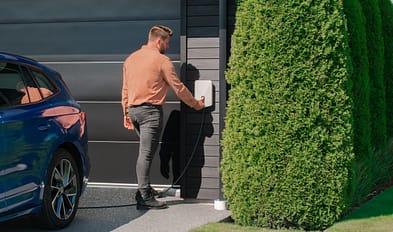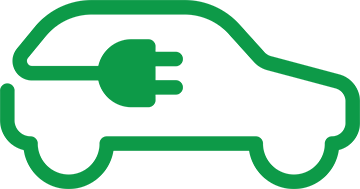
Installing an EV Charger?
Electric vehicles are becoming more popular - so, are you thinking of getting an EV charger for your home? Stop and consider these five things first: cost, wiring needs, and more. Make sure you take all factors into account before installing an EV charger!
How fast can your electric car charge?
Gettin' savvy on EV charging speed can help you pick the perfect charger for your ride. The speed may depend on the charger type, your vehicle's specs, and AC power in your house.
See the table below for estimated time to charge from 0-100%* an EV with either 7kW or 11kW home charger based on battery size.
EV Model | Battery Size | Charge Time (7kW) | Charge Time (11kW) |
Nissan Leaf | 40 kWh | 6 hours | 4 hours |
Tesla Model S | 100 kWh | 14 hours | 9 hours |
Volkswagen e-Golf | 35.8 kWh | 5 hours 20 min | 3 hours 30 min |
* While you’ll often see figures like this quoted, almost every EV owner will tell you that you NEVER charge from 0-100%. Shorter, more frequent top-ups tend to be the majority of charging experiences. Even on long road trips, drivers may stop at any % when convenient. They will rarely be driven down to under 5%, unless absolutely certain of arriving at a charging point or home.
These times are just estimates. Variables like weather, battery condition, age, and your driving habits can affect them.
Choose a home charger that meets your current and future needs. You may want a more powerful charger if you plan to upgrade to a bigger EV with a bigger battery.
Finally, get a certified professional to install your EV charger. They can help you pick the right one and guarantee proper installation and safety. Check your home's power can handle it or you might get a surprise shock!
What is the power capacity of your home?
Homeowners must evaluate the power capacity of their homes before installing an EV charger. A lot of electricity is needed and not considering this could cause electrical hazards or system breakdowns.
Different chargers affect power usage in different ways. Level 1 charging needs only 110v, while level 2 requires at least 240v and the right wiring and circuit compatibility. To safely power an EV Charger, it's best to install a dedicated 40-amp circuit and check circuit breaker ratings.
Homeowners must take into account the maximum power capacity of their home's electrical panel when installing an EV charger. On average, an electric car charger uses 7kW per hour, meaning a 40-amp circuit with a 240V outlet is needed for Level 2 charging if you want ten miles of range per charging hour. Assessing energy consumption patterns and making necessary provisions is important for balance before installation.
To avoid any issues, get professional help when assessing your options. Installing a GFCI (Ground Fault Circuit Interrupter) can be done if needed.
Finally, when looking to install an EV Charger, think about the stress of long drives and fuel expenses of conventional cars, and plan carefully before committing time and resources towards installation. You can choose between single-phase and three-phase power for your EV charger, based on personal preference.

Which is better: single-phase or three-phase power?
When installing an EV charger at home, you must choose between single-phase and three-phase power. The difference? Power capacity and charging speed. Let's compare them.
- Single Phase: Can deliver up to 7kW. Charging speed is typically 3-4 hours for an average EV battery. Cabling is smaller diameter.
- Three Phase: Up to 22 kW (3x more than single phase)! Faster charging than 11kW needs three-phase electrical supply. Required cabling is larger diameter.
If your home has single-phase electricity, you're stuck with slow charging speeds up to 7kw. However, with three-phase power, you can unlock higher charging speeds of up to 3x more.
In America, single-phase is usually the only option for homes. But, with more public charging stations, getting access to fast-charging options is getting easier. Plus, charge your car with sunlight to have enough energy to make everyone jealous, and the planet happy!
Do you have rooftop solar that can charge your EV?
Solar Power and EV Charging: A Match Made In Heaven?
Are you planning on installing an EV charger at home? If so, you must consider if your house has an existing solar panel system. With solar photovoltaic (PV) panels, electric vehicle owners can charge their vehicles during the day with green electricity from the sun, resulting in lower charging costs!

To better understand the compatibility between rooftop solar and EV charging, let's break it down into scenarios:
Scenario | Solar System Setup | EV Charging Options |
1 | No Solar Panels | Grid-powered charging or install a new PV system with an EV charger. |
2 | Solar Panel System without Batteries for Energy Storage | Directly connect the EV charger to the solar array; install a designated circuit for faster charging. |
3 | Solar Panel System with Batteries for Energy Storage | Check battery capacity is available and sufficient; set up a microgrid configuration for off-grid charging. |
The specifics depend on your existing PV system and energy consumption patterns. It's best to contact an electrician or certified professional with experience in both PV panels and Electric Vehicle chargers. They can offer guidance and give recommendations tailored to your situation.
Pro Tip: Charging your electric vehicle with solar power is the cheapest and greenest way to do it. This will save you money and help you avoid peak time-of-use rates from utility companies. Smart electric car chargers are the way of the future!
What are the benefits of using a smart electric car charger?
Smart electric car chargers offer many benefits that traditional chargers don't. Here are a few to think about before you buy one:
- Safety features - Smart EV chargers come with advanced safety like auto shut-off, overload protection, and short circuit detection. They are safer!
- Scheduled charging - Use the mobile app or web interface given by the manufacturer to easily schedule your charging session. This avoids peak energy and high tariffs and ensures your car is always charged when you need it.
- Variable charging speed - With a smart charger, you can adjust the charging speed based on needs. This gives more control over how quickly your car charges.
Plus, you can use excess solar power generated from solar panels at home. This reduces grid electricity dependency while making your home greener.
When buying a smart EV charger, remember to get one controlled by an app. It helps with regular updates. Follow installation instructions and have a pro install it. Lastly, check if your state has incentives or tax rebates for EV charger installations to help with costs.
Frequently Asked Questions
Q: What type of EV charger should I install at home?
A: There are different types of EV chargers available. The type you should install depends on factors such as the type of EV you have and your charging needs. Level 1 chargers are the slowest and can take up to 12 hours to fully charge an EV. Level 2 chargers are faster and can fully charge your EV in about 4-6 hours. DC fast chargers are the fastest option and can charge your EV to 80% in 20-30 minutes.
Q: How much will it cost to install an EV charger at home?
A: The cost of installing an EV charger at home will depend on various factors, including the type of charger, whether you need to upgrade your electrical panel, and the cost of labor in your area. On average, you can expect to pay anywhere from $500 to $2,500 to install an EV charger at home.
Q: Do I need an electrician to install my EV charger at home?
A: Yes, it's recommended that you hire a licensed electrician to install your EV charger at home. Safety is a top priority, and only a licensed electrician can ensure that your charger is installed properly and in compliance with local codes and regulations.
Q: What kind of electrical service do I need to install an EV charger at home?
A: The electrical service required for EV charger installation may vary depending on the charger type and the electrical specifications of your home. In most cases, a 240-volt, 50-amp circuit is required. Your licensed electrician can help you determine your home's electrical capacity and what kind of service you need for your charger.
Q: Where should I install my EV charger at home?
A: The best location for your EV charger will depend on various factors, including the proximity to your electrical service panel, your EV's charging port, and the available space. It's recommended that you install your charger in a covered area, such as a garage or carport, to protect it from the elements.
Q: Are there any rebates or incentives available for home EV charger installation?
A: Yes, some municipalities and utility companies offer rebates and incentives to encourage EV charger installation. Additionally, some EV manufacturers and dealerships offer incentives to offset the cost of installation. Check with your local government and utility company, as well as your EV manufacturer or dealership, to see what incentives are available in your area.

